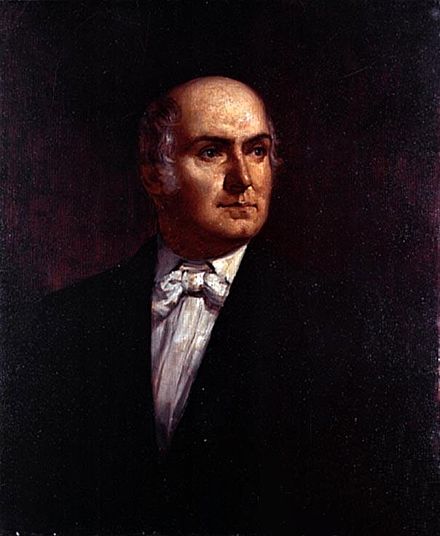Special to the Mirror by C. Augustus Landis.
Without Hesitation or reservation, Abel Parker Upshur (1790-1844) should be ranked as the most important person in history of the Eastern Shore and, in Virginia, in the quarter century leading to the conclusion of the Civil War..
Planter, Commonwealths Attorney. legislator, judge, Secretary of Navy, and Secretary of State. Counties in West Virginia and Texas are named after him. Streets in Washington, DC, and Portland, Oregon, are named after him. Mt. Upshur, aka Boundary Peak 17 in Alaska is named in his honor. A ship (destroyer) was named after him His portrait hangs in the State Department and at Blair House. Foremost in importance, however, were his writings on the meaning of the Constitution which were taught at law schools of University of Virginia and William and Mary for an entire generation.
There is no memorial on the Eastern Shore.
In 1840, Upshur published a treatise in refutation of Associate Justice Joseph Story’s Commentaries on the Meaning of the United States Constitution, published in 1833. It was Upshur’s writings that argued the Constitutional case for Virginia to secede from the Union in 1860 and Lincoln to resolve the issues of nullification, secession, and confederation vs a national consolidated union in a Civil War enforcing Story’s meaning of the Constitution.
Joseph Story (1779-1845) was considered the foremost jurist and Constitutional law scholar of his time. His Commentaries were based upon his reading of the Federalist Papers and the opinions of Chief Justice John Marshal with whom he had served on the Supreme Court for many years and for whom his work was dedicated. In Story’s view, the reference to We the People in the Preamble to the Constitution means all the people in the United States collectively as one consolidated people; the colonies became states at the time of ratification of the Constitution: the Constitution was not a compact between individual sovereign states as if a confederation; ,and the Constitution was the supreme law of the United States.
.
Upshur’s rebuttal, “A Brief Enquiry into the True Nature of our Federal Government”, argued (I think persuasively) that there was no collective “ We the People” from time of Declaration of Independence and at ratification of the Constitution, Upshur argued that each colony rebelled against England independently, established their own constitutions, and declared themselves independent sovereign states as did Virginia in 1775. Representatives they sent to the first congress (1744) represented only the people of their colony and at signing of the Declaration. (1776). In 1777, representatives signed Articles of Confederation, decidedly not an agreement to establish a consolidated or national government. . In deed, Article II of the Confederation agreement expressly said signatories were as sovereign states.
When exigencies of the time required the inadequacies b of the Articles be addressed, the Congress met and the first draft of the Constitution was reported on August 6, 1787. The Preamble read “ We the People of the States of New Hampshire, Massachusetts…(naming each of the 13 colonies/states) do ordain…” and the meaning was the people of each sate as individual and sovereign not as one collective or consolidated people .On September 8, 1787, a resolution was adopted to refer the draft of the Constitution to a committee of 5 to finalize style and order of matter but not to change anything in meaning of agreement.
On September 12 the committee reported the changes in style and on September 18 it was compared to all matters agreed upon. The Preamble read We the People of the United States. However, this was decided because the Constitution required only 9 states to ratify and it was not certain all 13 colonies/states would ratify. Thus all 13 could not ne named if one or more did not and it would be presumptuous to enumerate all.
Note. The Preamble is not law and has never been cited as. Ratification was by States and the “people” were citizens of the States.
Upshur believed strongly in maintaining the Union but he also asserted the States had the right of nullification and secession While the Constitution was the supreme law of the land and the Supreme Court the supreme arbiter in enumerated powers, because the Constitution was a compact between the States and the federal government it could not be the arbiter in disputes over non remunerated powers or dispute between the parties.. Thus, Upshur argued the States had the right to nullify and /or secede.
In the final analysis, the existential reason for Virginia to secede from the Union is found in Upshur’s refutation of Story’s Commentaries. Lincoln had promised that Virginia could remain in the Union as a slave state and he would not introduce Constitutional Amendment as required. Of course, everything Lincoln had said previously about slavery contradicted and Virginia did not believe him.
There are those, then and now, who think because Upshur was a wealthy planter and slave owner, his treatise was a prejudice in that property interest. Emphatically no. His and as well Story’s interest was meaning of the Constitution irrespective of issue in dispute.
If one would but read Story’s Commentaries and Upshur’s treatise they would understand why both Virginia and Lincoln believed they were fighting a Civil war over the meaning of the Constitution, why Lee felt honor bound to serve Virginia and the Confederacy, and why the many memorials to Virginia’s fallen in that great conflict proclaim faithfulness to the Constitution as their cause.





As to the Commentaries of Joseph Story (1779-1845), considered the foremost jurist and Constitutional law scholar of his time, being based upon his reading of the Federalist Papers, I too have read the complete set of Federalist papers, No. 1 through No. 85 several times now, and having the benefit of the passage of time to do some “fact-checking” of the assumptions made by James Madison and Alexander Hamilton in 1788, I find there is a lot of “pie-in-the-sky” contained therein, as well as what can be termed just plain bull****.
In FEDERALIST No. 85 from MCLEAN’s Edition, New York, to the People of the State of New York by Alexander Hamilton, titled “Concluding Remarks,” one gets more than a whiff of Hamilton’s fear of what would happen if the proposed Constitution were to be rejected, as we see in the following from that paper, to wit:
The additional securities to republican government, to liberty and to property, to be derived from the adoption of the plan under consideration, consist chiefly in the restraints which the preservation of the Union will impose on local factions and insurrections, and on the ambition of powerful individuals in single States, who may acquire credit and influence enough, from leaders and favorites, to become the despots of the people; in the diminution of the opportunities to foreign intrigue, which the dissolution of the Confederacy would invite and facilitate; in the prevention of extensive military establishments, which could not fail to grow out of wars between the States in a disunited situation; in the express guaranty of a republican form of government to each; in the absolute and universal exclusion of titles of nobility; and in the precautions against the repetition of those practices on the part of the State governments which have undermined the foundations of property and credit, have planted mutual distrust in the breasts of all classes of citizens, and have occasioned an almost universal prostration of morals.
Thus have I, fellow-citizens, executed the task I had assigned to myself; with what success, your conduct must determine.
I trust at least you will admit that I have not failed in the assurance I gave you respecting the spirit with which my endeavors should be conducted.
I have addressed myself purely to your judgments, and have studiously avoided those asperities which are too apt to disgrace political disputants of all parties, and which have been not a little provoked by the language and conduct of the opponents of the Constitution.
The charge of a conspiracy against the liberties of the people, which has been indiscriminately brought against the advocates of the plan, has something in it too wanton and too malignant, not to excite the indignation of every man who feels in his own bosom a refutation of the calumny.
The perpetual charges which have been rung upon the wealthy, the well-born, and the great, have been such as to inspire the disgust of all sensible men.
And the unwarrantable concealments and misrepresentations which have been in various ways practiced to keep the truth from the public eye, have been of a nature to demand the reprobation of all honest men.
It is not impossible that these circumstances may have occasionally betrayed me into intemperances of expression which I did not intend; it is certain that I have frequently felt a struggle between sensibility and moderation; and if the former has in some instances prevailed, it must be my excuse that it has been neither often nor much.
end quotes
So upon reading those words, what was Joseph Story to think, given that his Commentaries on the Constitution of the United States were written in 1833, just 45 years after the publication of the Federalist Papers?
Would he refute Hamilton or uphold him, given these following words from Federalist No. 85, to wit:
Let us now pause and ask ourselves whether, in the course of these papers, the proposed Constitution has not been satisfactorily vindicated from the aspersions thrown upon it; and whether it has not been shown to be worthy of the public approbation, and necessary to the public safety and prosperity.
Every man is bound to answer these questions to himself, according to the best of his conscience and understanding, and to act agreeably to the genuine and sober dictates of his judgment.
This is a duty from which nothing can give him a dispensation.
IT is one that he is called upon, nay, constrained by all the obligations that form the bands of society, to discharge sincerely and honestly.
No partial motive, no particular interest, no pride of opinion, no temporary passion or prejudice, will justify to himself, to his country, or to his posterity, an improper election of the part he is to act.
Let him beware of an obstinate adherence to party; let him reflect that the object upon which he is to decide is not a particular interest of the community, but the very existence of the nation; and let him remember Let us now pause and ask ourselves whether, in the course of these papers, the proposed Constitution has not been satisfactorily vindicated from the aspersions thrown upon it; and whether it has not been shown to be worthy of the public approbation, and necessary to the public safety and prosperity.
Every man is bound to answer these questions to himself, according to the best of his conscience and understanding, and to act agreeably to the genuine and sober dictates of his judgment.
This is a duty from which nothing can give him a dispensation.
IT is one that he is called upon, nay, constrained by all the obligations that form the bands of society, to discharge sincerely and honestly.
No partial motive, no particular interest, no pride of opinion, no temporary passion or prejudice, will justify to himself, to his country, or to his posterity, an improper election of the part he is to act.
Let him beware of an obstinate adherence to party; let him reflect that the object upon which he is to decide is not a particular interest of the community, but the very existence of the nation; and let him remember that a majority of America has already given its sanction to the plan which he is to approve or reject.
end quotes
If in 1788, Hamilton was telling the candid world that a majority of America has already given its sanction to the plan, would Story gainsay him in 1833 and say it was not so, with Hamilton stating thusly in Federalist No. 85:
I shall not dissemble that I feel an entire confidence in the arguments which recommend the proposed system to your adoption, and that I am unable to discern any real force in those by which it has been opposed.
I am persuaded that it is the best which our political situation, habits, and opinions will admit, and superior to any the revolution has produced.
end quotes
Hamilton then went on as follows:
No advocate of the measure can be found, who will not declare as his sentiment, that the system, though it may not be perfect in every part, is, upon the whole, a good one; is the best that the present views and circumstances of the country will permit; and is such an one as promises every species of security which a reasonable people can desire.
I answer in the next place, that I should esteem it the extreme of imprudence to prolong the precarious state of our national affairs, and to expose the Union to the jeopardy of successive experiments, in the chimerical pursuit of a perfect plan.
I never expect to see a perfect work from imperfect man.
The result of the deliberations of all collective bodies must necessarily be a compound, as well of the errors and prejudices, as of the good sense and wisdom, of the individuals of whom they are composed.
The compacts which are to embrace thirteen distinct States in a common bond of amity and union, must as necessarily be a compromise of as many dissimilar interests and inclinations.
How can perfection spring from such materials?
end quotes
Given all of this, could it be said that Story when writing his Commentaries was backed into a corner?
As to pie-in-the-sky, or a look through rose-colored glasses, Hamilton continues as follows in Federalist no. 85:
We may safely rely on the disposition of the State legislatures to erect barriers against the encroachments of the national authority.
If the foregoing argument is a fallacy, certain it is that I am myself deceived by it, for it is, in my conception, one of those rare instances in which a political truth can be brought to the test of a mathematical demonstration.
Those who see the matter in the same light with me, however zealous they may be for amendments, must agree in the propriety of a previous adoption, as the most direct road to their own object.
end quotes
While that may have been true in 1833, in our times today, with the “national authority” coming further and further into our lives, can we really rely on the disposition of the State legislatures to erect barriers against the encroachments of the national authority?
And regardless of what may have been going on in 1833 when Story wrote his Commentaries based on the Federalist Papers, that answer in our times today is in the negative!
Which brings us to Hamilton’s conclusion, as follows:
These judicious reflections contain a lesson of moderation to all the sincere lovers of the Union, and ought to put them upon their guard against hazarding anarchy, civil war, a perpetual alienation of the States from each other, and perhaps the military despotism of a victorious demagogue, in the pursuit of what they are not likely to obtain, but from time and experience.
It may be in me a defect of political fortitude, but I acknowledge that I cannot entertain an equal tranquility with those who affect to treat the dangers of a longer continuance in our present situation as imaginary.
A nation, without a national government, is, in my view, an awful spectacle.
The establishment of a Constitution, in time of profound peace, by the voluntary consent of a whole people, is a prodigy, to the completion of which I look forward with trembling anxiety.
I can reconcile it to no rules of prudence to let go the hold we now have, in so arduous an enterprise, upon seven out of the thirteen States, and after having passed over so considerable a part of the ground, to recommence the course.
I dread the more the consequences of new attempts, because I know that powerful individuals, in this and in other States, are enemies to a general national government in every possible shape.
Many reflections naturally crowd upon the mind at such a moment,—many grateful recollections of the past, and many anxious thoughts of the future.
The past is secure.
It is unalterable.
The seal of eternity is upon it.
The wisdom which it has displayed and the blessings which it has bestowed, cannot be obscured; neither can they be debased by human folly or human infirmity.
The future is that which may well awaken the most earnest solicitude, both for the virtue and the permanence of our republic.
The fate of other republics — their rise, their progress, their decline, and their fall — are written but too legibly on the pages of history, if indeed they were not continually before us in the startling fragments of their ruins.
They have perished, and perished by their own hands.
Prosperity has enervated them, corruption has debased them, and a venal populace has consummated their destruction.
– Chapter 45, Commentaries on the Constitution of the United States written by Associate Justice of the Supreme Court of the United States Joseph Story and published in 1833.
In those last two sentences, one would swear he was talking about us today!